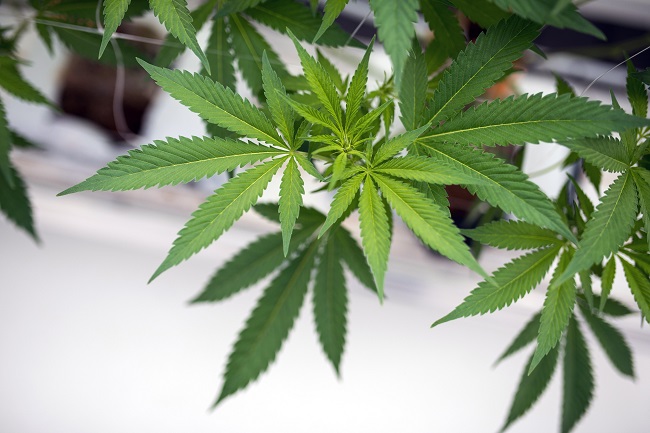 While a majority ofstates have jumped on the medical marijuana bandwagon, and ninehave legalized recreational marijuana use, the federal governmentcontinues to classify marijuana as a highly controlled, Schedule Idrug. (Photo: Bloomberg)
While a majority ofstates have jumped on the medical marijuana bandwagon, and ninehave legalized recreational marijuana use, the federal governmentcontinues to classify marijuana as a highly controlled, Schedule Idrug. (Photo: Bloomberg)
To date 29 states and the District of Columbia have legalizedmarijuana for medicinal purposes. Some states (i.e.,California) have been grappling with the implications of medicinalmarijuana use for several years, while others (i.e., Pennsylvania)are just beginning to explore the complicated world of medicinalcannabis and its many tentacles. As a labor and employment lawattorney, when it comes to medical marijuana, the question I ammost asked is “what does medical marijuana mean for our workplaceand/or our drug-testing policies?”
|Given the dearth of state regulations and case law on the topic,answering this question is not easy. Generally, the answer to thisquestion turns on two things: the medical marijuana legislation inthe state(s) in which the company does business; and the company'soverall temperament for medical marijuana usage. However, furtherclouding the answer is federal law. While a majority of states havejumped on the medical marijuana bandwagon, and nine have legalizedrecreational marijuana use, the federal government continues toclassify marijuana as a highly controlled, Schedule I drug.
|The Controlled Substances Act (CSA), federal legislation passedin 1970 as part of the Comprehensive Drug Abuse and Prevention Act,specifies how certain substances—such as marijuana—are regulatedunder federal law. Under the CSA, Schedule I drugs are those thathave a high potential for abuse, have no currently accepted medicaluse and lack safety for use under medical supervision. Consideringthat the federal government has the power to control funding forcertain companies (i.e., community health centers and colleges),regulate the business of others (i.e., transportation companies)and could utilize the full power of federal law enforcement, thefederal classification of marijuana is not insignificant.
|So, how does the federal treatment of marijuana informan employer's actions regarding an employee using medicalmarijuana?
|Regarding the enforcement of federal marijuana laws, theRohrabacher-Blumenauer Amendment (formerly known as theRohrabacher-Farr Amendment) is instructive. This amendmentprohibits the U.S. Department of Justice from using federal fundsto prevent state implementation of medicinal marijuana laws. Perthe holding of the U.S. Court of Appeals for the Ninth Circuit inUnited States v. McIntosh, the amendment also “prohibitsthe DOJ from spending funds for the prosecution of individuals whoengage in conduct permitted by the [state medical marijuana laws]and who fully complied with such laws.” Generally, this means thata medical marijuana patient who is in strict compliance with themedical marijuana laws of his resident state may not be prosecutedby the federal government for possession or use.
|Regarding how medicinal marijuana will be treated fordrug-testing purposes, U.S. Department of TransportationRegulations apply. Typically, a drug test cannot be certified aspositive until a medical review officer verifies the result. Fordrivers subject to the Federal Motor Carrier Safety Act, Departmentof Transportation Regulations state that a medical review officermust verify as positive a confirmed test result for drugs, unlessthe employee presents a legitimate medical explanation for thepresence of the drug in his system. In an updated “MedicalMarijuana Notice” issued in the fall, the Department ofTransportation stated plainly that the use of medical marijuana,pursuant to state law, does NOT constitute a legitimate medicalreason for a positive drug test.
|The DOT's Medical Marijuana Notice makes it clear thatmarijuana, in all forms, remains illegal under the CSA.Accordingly, the DOT expects that medical review officers willtreat marijuana, whether used recreationally or medicinally, as aSchedule I illegal drug. Accordingly, the DOT notice provides that“Medical review officers will not verify a drug test as negativebased upon information that a physician recommended that theemployee use 'medical marijuana' … It remains unacceptable for anysafety‐sensitive employee subject to drug testing under theDepartment of Transportation's drug testing regulations to usemarijuana.”
|What about drug tests for employees not regulated by theDOT?
|The DOT regulations nonetheless apply! The reality is that mostmedical review officers follow DOT testing guidelines for all drugtests. They do this to ensure consistency andpredictability. Accordingly, even when a non-DOTregulated employee tells the medical review officer that he iscertified to use medicinal marijuana, the medical review officerwill nonetheless certify the test as positive. The medical reviewofficer may include an external note to the employer that theemployee claimed medicinal use. However, the medical review officerwill not seek to confirm the employee's claim or to otherwisedetermine if the employee is a certified user under state law.
|Finally, the Americans with Disabilities Act is instructive.After all, most individuals certified to use medical marijuana willbe so certified because they suffer from a disability. Under theADA, “qualified individuals with a disability” are protected fromdiscrimination and are entitled to reasonable accommodation.Notably, however, the ADA provides that a person who is “currentlyengaging” in the illegal use of drugs is not a “qualifiedindividual with a disability.” The ADA is a federal lawand because the CSA states that all marijuana use is illegal, theADA does not protect an individual currently using medicalmarijuana, even if the individual's use is compliant with his/herstate's medical marijuana laws.
|So, what is the federal take-away?
|With the threat of federal prosecution removed (at least throughSeptember 2018), the federal treatment of medical marijuana willnot deter employees who qualify under their state's medicalmarijuana laws from using medical marijuana. The caveat here willbe with regard to employees whose jobs are regulated by federallaw—for example CDL drivers.
|Drug testing facilities will not help employers decide how tohandle medical marijuana use. A positive drug test will be apositive drug test, regardless of the fact that the employee wasusing medical marijuana in accordance with state law. Accordingly,at the end of the day, where the employee is not regulated byfederal law, the burden remains on the employer to decide, inaccordance with its policies, how, if at all, the employee'smedicinal marijuana use impacts employment status.
|An individual using medical marijuana to treat a serious healthcondition, is not a qualified individual with a disability underthe ADA. Although their serious health condition may constitute adisability, that the individual is “currently engaging” in theillegal use of drugs will remove them from ADA protection.
|Employers reading that last bullet point, may be breathing asign of relief. To those employers I say: Not so fast. We cannotforget about state law, a point three courts in New England madeabundantly clear last summer.
|In Barbuto v. Advantage Sales andMarketing, (Massachusetts), Noffsinger v. SSCNiantic Operation, (Connecticut) and Callaghan v.Darlington Fabrics (Rhode Island), prospective employees weredenied employment, pursuant to neutral drug-testing policies, whentheir post-offer pre-employment drug test returned positive formarijuana. In all three cases, the prospective employees disclosedtheir use of medical marijuana to treat a disability. The employersfiled motions to dismiss, arguing that federal law pre-empted statelaw and, thus, they were justified in denying employment undertheir neutral drug testing policies. The motions were denied. Inallowing the suits to move forward, the courts recognized causes ofaction under state law disability discrimination statutes and underthe discrimination clauses contained in the state medical marijuanaacts.
|The takeaways from these three cases is as follows:
|Though the ADA may not protect disabled individuals usingmedical marijuana, state law disability laws (i.e., thePennsylvania Human Relations Act) may.
|Many state medical marijuana acts include a clause prohibitingdiscrimination based on an employee's status as a medical marijuanauser. Pennsylvania is one of these states. Accordingly, summarilyrefusing to hire a prospective employee who discloses medicalmarijuana use may be prohibited.
|Considering the above two points, employers should engage in theinteractive process with an employee who discloses a disability anduse of medical marijuana for that disability to evaluate theemployee's ability to safely perform the essential functions of thejob with or without reasonable accommodation.
|State law also informs how employers interact with currentemployees who may be using or may consider using medical marijuana.Using Pennsylvania as the example, employers:
- May prohibit the use of medical marijuana on company premisesand during working hours;
- May discipline an employee for being under the influence ofmedical marijuana while at work;
- May restrict an employee from performing certain safetysensitive positions while they are under the influence of medicalmarijuana; and
- Are not required to take any action that would violate federallaw (i.e. allowing a medical marijuana user to perform a jobrequiring a CDL).
As employers undertake the burden of parsing the interactionbetween federal and state law and addressing medical marijuana usein their workplaces, they should consider the following:
- Whether they are regulated and funded by the federal governmentin a way that should impact their drug testing policies and theirtreatment of medical marijuana;
- The overall temperament of the company for medicinal marijuanause;
- The company's existing drug testing policies, definitions underthe policies and whether revisions are necessary;
- The medical marijuana laws in the state(s) in which theyoperate and whether the laws allow employers to discipline for useof medical marijuana and, if so, in what contexts;
- Whether the laws allow employers to regulate medical marijuanause for safety sensitive positions and, if so, whether they employany individuals in such safety sensitive positions; and
- The impact of the Americans with Disabilities Act and the statelaw component and their resulting obligations thereunder.
Employers would be wise to consult with counsel as they navigatethis issue and should not wait until they are handed a positivedrug test, noting medical marijuana use, to answer thesequestions.
 Denise Elliottis a member of the McNees Wallace &Nurick's labor and employment practice group, focuses her practiceon defending self-insured employers in workers' compensationmatters and providing representation and counsel to clients inemployment discrimination litigation, ADA/FMLA compliance, andsafety and health issues. She can be reached [email protected].
Denise Elliottis a member of the McNees Wallace &Nurick's labor and employment practice group, focuses her practiceon defending self-insured employers in workers' compensationmatters and providing representation and counsel to clients inemployment discrimination litigation, ADA/FMLA compliance, andsafety and health issues. She can be reached [email protected].
Complete your profile to continue reading and get FREE access to BenefitsPRO, part of your ALM digital membership.
Your access to unlimited BenefitsPRO content isn’t changing.
Once you are an ALM digital member, you’ll receive:
- Critical BenefitsPRO information including cutting edge post-reform success strategies, access to educational webcasts and videos, resources from industry leaders, and informative Newsletters.
- Exclusive discounts on ALM, BenefitsPRO magazine and BenefitsPRO.com events
- Access to other award-winning ALM websites including ThinkAdvisor.com and Law.com
Already have an account? Sign In
© 2024 ALM Global, LLC, All Rights Reserved. Request academic re-use from www.copyright.com. All other uses, submit a request to [email protected]. For more information visit Asset & Logo Licensing.








